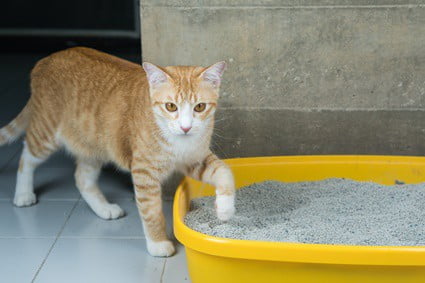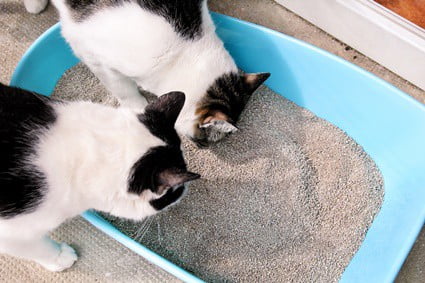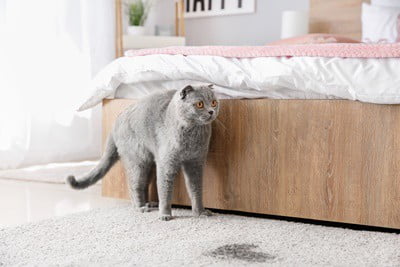Cat urine has a strong, distinct, and unpleasant smell, reminiscent of ammonia. This is due to the presence of undiluted urea within the waste. When a cat releases urine, the urea undergoes a range of chemical reactions. Releasing ammonia is chief among these.
Ammonia has an unmistakable, pungent smell. Even the slightest hint of ammonia is undesirable in the home. Unfixed male cats have particularly strong-smelling urine as a result of hormones. Other explanations include excessive protein in the diet, urinary tract infections, dehydration, and kidney problems.
Cats are not offended by the scent of their own urine, so don’t ignore the strong smell. Lingering odors are an invitation to urinate in the same location. This will be particularly unwelcome if this is outside the litter box.
Why Does Cat Pee Smell So Bad?
The smell of feline urine is not among a cat’s charms. Cats’ pee has a strong and pungent aroma. A senior cat with a strong urine odor is particularly troublesome as they often struggle to reach the litter box in time.
To understand why cat urine smells so strong, we need to consider evolution. Domesticated cats are descended from desert-dwelling animals. Water was rare in such arid climes, so cats evolved to hydrate by absorbing water through their urine.
This means that the kidneys of a cat absorb as much water as possible from the urine. This is why cats rarely drink and typically urinate less than other animals.
Unfortunately, removing this water means the urine is not diluted in any way. When a cat uses the litter box, it is releasing pure urine. This pee is comprised of the following:
- Urea (carbamide) and uric acid, waste proteins filtered by the kidneys
- Urobilin (urochrome), a pigment that gives urine its traditional yellow shade
- Sodium, which is again filtered by the kidneys
- Electrolytes, which would ordinarily provide hydration
- Creatinine, a waste chemical compound generated by physical movement
- Waste bacteria, potentially including Toxoplasma gondii
- Pheromones for communication with other felines
Urea is the biggest offender of all, especially when left to linger without cleaning. Urea breaks down over time, releasing an increasingly strong scent. This is often where the smell of ammonia connected to cat urine stems from.
Why Does My Cat’s Urine Smell Stronger Than Usual?
“Why does my cat’s pee smell strong?” is a common question posed by cat owners. If you are only noticing the smell for the first time, something may be amiss. If your cat’s pee smells stronger than usual, there will likely be a reason.
We will discuss the strong smell of ammonia, the most common complaint surrounding feline urine, in a moment. In between, two other distinct aromas are worthy of immediate attention.
Why Does Cat Pee Smell Sweet?
A saccharine-sweet smell of urine in cats is a warning symptom of kidney disease, or more commonly, feline diabetes. If your cat is carrying extra weight, diabetes is a real risk.
The American Journal of Physiology recommends a high protein, low-carbohydrate diet for cats at risk of diabetes. This comes with its own problems, most notably a strong ammonia smell to the urine.
Prevention and failing to let things advance to the point of danger is the best course of action. Eating smaller portions more often is one step you could consider. Lay off the treats, too, and discuss any supplementation with a vet to avoid side effects.
Above all, try to keep your cat active. This can be easier said than done when cats reach double figures in age. Likely, your cat will just want to sleep and eat. If you can encourage your cat to play, it will be beneficial in the longer term.
Why Does Cat Pee Smell Like Fish?
Another distinct smell that can be assigned to cat urine is a fishy stench. This is every bit as unpleasant as it sounds. If you notice this aroma, check your cat’s anal glands for any discharge. These glands are found at 4 o’clock and 8’clock on female anatomy.
These glands release a strong, pungent smell. Cats use them to communicate with each other. The anal glands ensure that cats can leave a message through their feces. Usually, this will be a warning of a claim to the territory.
If these anal glands are swollen, they will become inflamed. This can be painful for the cat and will result in the aforementioned fishy smell in the urine. This means the anal glands must be expressed. You can do this yourself or ask a vet.
Keep an eye for any discharge in your cat’s urine, too. Sometimes the aroma of fish is related to the presence of bacteria in the urethra. As discussed, all cat urine contains bacteria – some benign, some harmful. These bacteria need to be balanced.
If unwelcome bacteria outweigh the good, infection becomes likely. This may be a full urinary tract infection or a minor condition that rights itself in days.
Why Does Cat Urine Smell Like Ammonia?
A strong smell of ammonia is arguably the most common complaint attributed to cat urine. Even in a litter box, cat urine will smell strong. Urine left to fester will see urea break down, releasing ammonia into the atmosphere.
The easiest way to manage this is by cleaning your cat’s litter box multiple times a day. This will also encourage your cat to use the litter box. Cats dislike eliminating in an unclean environment.
If your cat urinates elsewhere in the home, the smell of ammonia will encourage them to continue doing so. The smell of ammonia will also be increasingly difficult to manage and eradicate.
You should also ensure that the smell is not emanating from your cat itself. Older cats struggle to groom themselves, especially if overweight or arthritic. This means that urine may cling to fur. Lend a hand with grooming using unscented wet wipes.
Of course, simply cleaning up after your cat is only half the battle. If your cat’s pee smells bad, there will be a reason why. Identify what is responsible for the strong smell and, if possible, take action to rectify it.

Hormones
Arguably the most common explanation for cat urine to smell strongly of ammonia is hormones. Cats enjoy the fact that their pee smells so pungent. It helps them send a message when marking territory or announcing their presence.
With this in mind, the ammonia scent in cat urine is linked to gender and reproductive status. When an unspayed female is ready to mate, she will announce this through her urine. Intact tomcats return this message in kind through their own pee.
Male cats are also typically more territorial than their female counterparts. The Canadian Journal of Zoology explains how male felines prefer to use urine to mark this terrain. The smell is unmistakable and unique to every cat.
Neutering male cats adjust the hormones in the body. This will directly impact the levels of urea found in the urine, measured in molar mass per liter (mmol/l.) An intact tomcat will usually have a urea mass of 1,640 mmol/l. This drops sharply to around 900 mmol/l after neutering.
This will reduce the strength of the ammonia smell in the urine. What’s more, it will also reduce a tomcat’s desire to mark territory. Once fixed, male cats are famously calmer and easier to litter train.
Dehydration
We discussed how cats draw moisture and hydration from their urine. This means that cats can sometimes be reluctant to drink water. A natural inclination to be fussy about drinking water can add to this. Common reasons for a cat to reject water include:
- The smell of chlorine or heavy metals from tap water
- The bowl is too narrow, resulting in painful whisker fatigue
- There is too much water in the bowl or too little
- The bowl is located close to a food bowl or litter tray, leading to a lingering smell
- Another cat has drunk from the same water bowl
Some cats are also innately suspicious of still water. This, much like the tendency to avoid hydration, is based on instinct. In the wild, cats will always drink from running sources, such as rivers or streams.
Dehydration causes a strong ammonia smell due to the lack of fluid circulating the body. When this occurs, the kidneys hold onto what little water they can find. This leads to increasingly concentrated urine and the associated ammonia stench.
You can check if your cat is dehydrated by gently pinching the nape of its neck. If the skin snaps back into place, the cat is fine. If the skin is slow to return its shape, it lacks elasticity through dehydration. Encourage the cat to drink water.
Inappropriate Diet
A substandard or inappropriate diet may explain why your cat’s urine smells so strongly. As obligate carnivores, cats require a high-protein diet. Alas, it is possible to have too much of a good thing.
Whenever a cat consumes protein, the liver converts it into amino acids within the body. These acids can upset the balance of pH within the feline body. As per the Journal of Nutrition, this should typically sit between 6.0 and 6.4.
When a cat eats excessive levels of protein, the liver cannot break it down. An older cat with an equally aged liver will struggle with this more than most. This acidity in the urine leads to greater urea levels – and, by extension, the strong smell of ammonia.
Thankfully, it’s simple to rectify this without a wholesale change in diet. Any reputable food brand will offer a range of nourishment designed for senior cats. The ingredients of these foods will factor liver performance into their composition.
If the problems persist, you may need to reconsider your cat’s diet. Feed smaller portions more frequently, and cut out additional protein snacks, such as chunks of chicken or other meat. Bringing more fish into a feline diet will also encourage positive protein intake.
Urinary Tract Infections
Urinary tract infections, or UTIs, are common in senior cats, especially spayed females, or those living with diabetes. A feline UTI is typically caused by an imbalance of bacteria in the bladder. This could be due to feces entering the urethra from a dirty litter tray.
Alternatively, your cat may be struggling with bladder stones. These occur when minerals found in cat urine cannot be processed. Once hardened into crystals, these grow in size and become stones. Blocking the urine flow causes less dilution of the urine.
A cat living with a UTI will often avoid the litter box. In the mind of the cat, the box is causing the pain, not infection. Urinating outside the litter box, leaving an increasingly strong smell behind, can rapidly become problematic.
Some cats will overcome a UTI organically, especially if they are a regular occurrence. It is not inadvisable to leave your cat to recover by itself, though. A UTI is painful for your cat, so get it a course of antibiotics to clear up the infection.

Kidney Issues
We have mentioned the impact of the kidneys on feline urination several times. The elephant in the room is that your cat may be living with significant kidney issues. Renal failure becomes increasingly commonplace as cats grow older.
From the moment a cat reaches adulthood, its kidneys start to degenerate. This is not as concerning as it may sound. Cats only need around 25% of kidney function to live a full, normal life. When kidneys slip below this level of function, health concerns arise.
One of the most concerning elements of kidney underperformance is acute uremia. This condition involves a build-up of waste in the urea as the kidneys cannot process it appropriately. This leads to urine that smells strongly of ammonia and foul-smelling breath.
As your cat starts to age, it will need regular examinations from a vet. The Journal of Feline Medicine and Surgery recommends using an ultrasound, which is reliable and non-invasive. Take your cat for a check-up once a year.
If your cat is unfortunate enough to be diagnosed with kidney failure, you may face a tough choice. Kidney failure is the leading cause of mortality in senior cats and will eventually be fatal.
My Cat’s Feces Smells Like Ammonia
Sometimes, it isn’t the smell of urine that causes consternation in cat owners but feces. A foul-smelling stool can be just as concerning – and arguably even more unpleasant – than urine.
Before growing concerned about the smell of your cat’s stool, ensure that the smell is not arising from urine. Cats rarely pee in a dirty litter box, but sometimes they’ll make an exception. Feces can mix with stale urine to create a particularly unappealing aroma.
As with urine, there is a range of potential explanations of the scent of ammonia in a cat’s poop. The most common reasons for this include:
- A poor quality diet that lacks nutrition or provides excessive protein, starch, or fat
- Allergic reactions to a new food, such as grain or particular vitamins
- Bacteria in the gut, potentially caused by hunting mice or eating raw meat and fish
- Side effects of medication that lead to a hormonal imbalance
- A parasitic infestation in the gut. Veterinary Clinics of North America: Small Animal Practice namechecks whipworms and threadworms as the likeliest culprits
Look into amending your cat’s diet and ensure that the litter box is regularly cleaned. If this yields no results, it is advisable to seek professional advice. A particular foul-smelling stool can be a warning of health concerns in cats.
What Can I Give My Cat for Strong Urine?
As discussed, the remedy for strong-smelling urine is dependent on the root cause of the odor. To recap, consider the following techniques:
- Neutering male cats
- Encouraging the cat to hydrate
- Feed a balanced diet
If these techniques do not see results, consider consulting a vet. Your cat’s kidneys should be checked, along with any warning signs of a urinary tract infection.
If you have ever wondered, “why does my cat’s urine have a strong ammonia smell?” you now have the answer. If your cat is an unneutered male, it’s a matter of nature. In any other circumstance, you can take action to improve this unwelcome stench.

